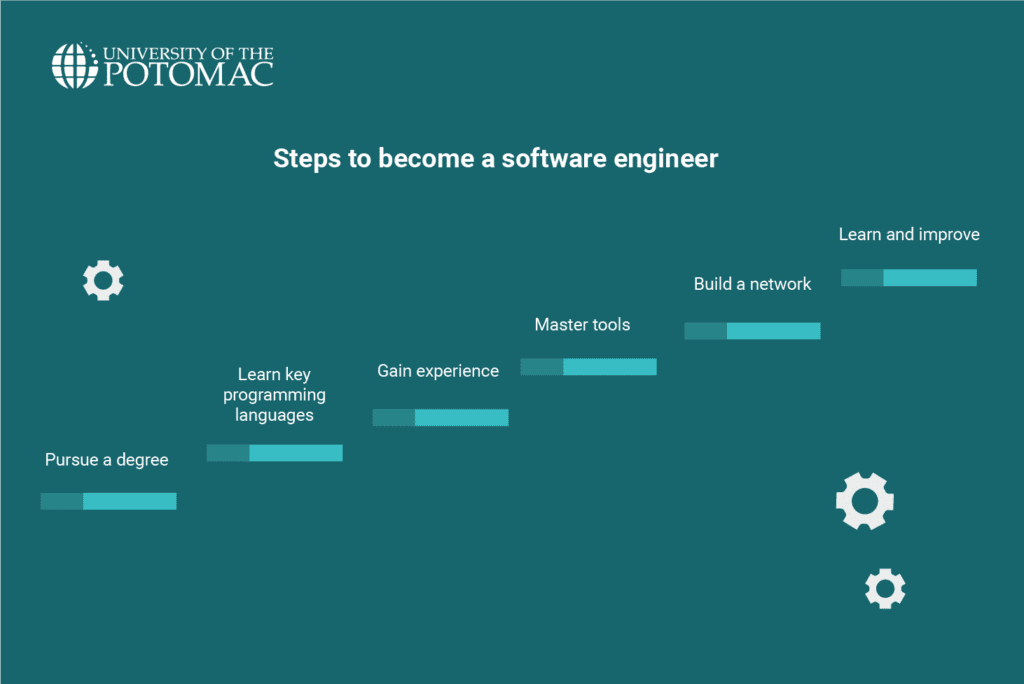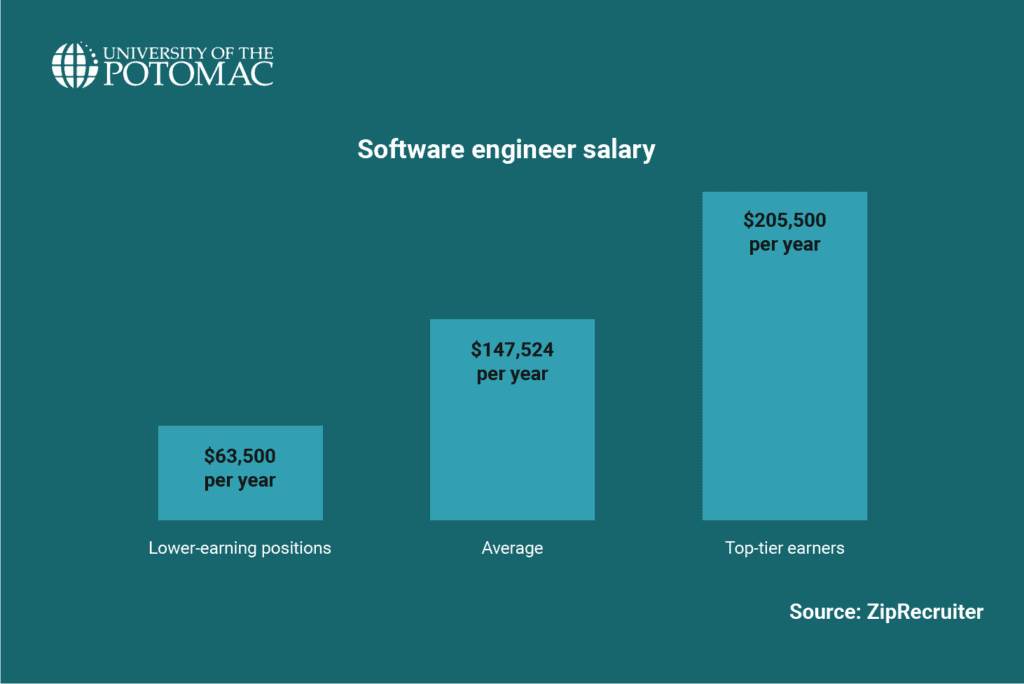Key Takeaways
- Becoming a software engineer involves building a solid educational background, gaining practical experience, and committing to ongoing learning.
- Key programming languages to focus on include Java, Python, C++, and JavaScript.
- Software engineers can expect lucrative salaries, with entry-level roles starting at approximately $63,500 and experienced professionals earning up to $205,500 a year.
Software is responsible for nearly all digital interactions, from sending emails to unlocking phones, browsing websites, and using apps. It consists of a set of instructions or code that directs how hardware (like your phone or computer) functions to perform these tasks.
Think of it like the blueprint for a building; just as a blueprint outlines every detail needed to construct a home, software lays out the structure and flow of our digital experiences. But what exactly makes software tick, and who is behind its creation? Well, it’s a team effort, but software engineers and the code they design are at the center of it all.
If you’ve ever wondered how to become a software engineer, you’re already starting to think like someone who might build the next wave of innovations. The prospect of mastering software can initially seem intimidating due to its complexity and the constant evolution of technology. However, it is also gratifying—if you’re willing to embrace the challenge.
How to Become a Software Engineer

Software engineers’ expertise in solving problems with code and creating innovative solutions makes them crucial to many industries beyond IT, including healthcare, entertainment, finance, and more.
With the right steps, commitment, and a passion for problem-solving, anyone can enter this field.
1. Pursue a degree
The first step for those aspiring to become software engineers is earning a degree in a relevant field. This education will lay the foundation for both the theory and practice of software development.
While many choose degrees in computer science or software engineering, there are other strong options like information technology, data science, or even mathematics that can set you on the right path. The core principles of these fields align well with software engineering and open the door to a variety of specialized careers.
During your studies, you’ll learn about programming languages and develop a strong understanding of concepts like algorithms, data structures, computational theory, and much more.
Though some software engineers have found success without formal education, most employers, especially at top tech companies, expect at least a bachelor’s degree.
2. Learn key programming languages
After you’ve built a solid overall foundation in this field, it’s time to focus on mastering the programming languages that will help you succeed. As a software engineer, your primary tool is code. Some popular programming languages you should explore include Java, Python, C++, and JavaScript.
However, mastering programming languages alone won’t make you an exceptional software engineer. To truly excel, you’ll also need to thoroughly understand the fundamentals that make software efficient and effective: algorithms and data structures.
Algorithms are simply step-by-step instructions that help solve problems, while data structures organize and store data. Together, they allow you to write code that works fast, scales well, and handles a variety of tasks seamlessly. The more you understand these, the better you’ll be at writing clean, high-performance code.
3. Gain experience
Experience is necessary for growth. Classroom learning gives you the foundation, but real-world experience helps refine your skills and develop new techniques. The more experience you get, the more confident and capable you’ll become.
One of the best ways to gain experience is through internships. These give you the chance to work alongside professionals on real projects, apply what you’ve learned, and network with others in the industry. Connections made during internships can be invaluable when you’re ready to land your first full-time role.
Freelance work is another great way to build your portfolio and gain hands-on experience. Platforms like Upwork and Fiverr allow you to take on smaller projects that let you demonstrate your abilities and gain confidence. Plus, you’ll get experience working directly with clients, which is an essential skill.
Furthermore, hackathons and coding challenges are fantastic for pushing yourself and improving your skills. They give you the opportunity to work on projects under pressure, which hone your problem-solving abilities. Coding challenges on sites like LeetCode and HackerRank offer practical exercises to sharpen your algorithmic thinking and become more efficient at tackling problems.
4. Master tools
As you progress, it’s important to get comfortable with various software development tools. They’re not just nice-to-haves—they’re what will improve your workflow and ensure that the software you create is reliable.
Git and GitHub are essential for version control. They allow you to track changes in your code and collaborate with others. GitHub also lets you host your code online, share your projects, and work with other developers. It’s a platform that can showcase your work to potential employers.
You’ll also spend a lot of time working with IDEs (integrated development environments). These tools help you write, debug, and test your code more efficiently by providing features like syntax highlighting, error checking, and integrated debugging tools.
Another key tool for software engineers is a database management system (DBMS). Whether it’s MySQL, MongoDB, or PostgreSQL, being able to manage data effectively is crucial for software development. Mastering these tools helps you handle large amounts of data and ensures your applications are scalable and efficient.
5. Build a network
Networking is all about building relationships with other professionals who can help you grow, learn, and stay up to date on industry trends.
You can expand your network through:
- Meetups
Attend local meetups or online events where you can connect with other developers. Whether attending workshops, networking events, or informal gatherings, these are great places to learn and build relationships with others in the community.
- Online communities
Join forums and platforms like Stack Overflow, Reddit’s r/learnprogramming, or GitHub. These online spaces are perfect for asking questions, sharing knowledge, and collaborating on projects with developers from all around the world.
- Professional organizations
Consider joining professional organizations offering resources, events, and networking opportunities to help you advance your career and keep up with industry developments.
6. Apply for jobs
Once you’ve gained the skills and experience, you can safely start applying for software engineering jobs. But before you submit your application, make sure you’re presenting yourself in the best possible light.
Writing a strong resume is essential for standing out in a crowded job market. Highlight your technical skills, hands-on experience, and any personal projects, internships, or freelance work. Employers want to see that you’ve applied your knowledge in real-world scenarios.
When it comes to interviews, preparation is everything. Be ready to discuss your technical skills, your experience, and your problem-solving approach. Many software engineering interviews include coding tests or technical challenges, so practicing in advance is essential. Also, research the company and be prepared to discuss how your skills can contribute to their projects.
7. Learn and improve
The tech world doesn’t stand still, and neither should you. Software engineering is constantly evolving, with new languages, tools, and technologies emerging regularly. So, to stay competitive, you need to make learning a habit.
Interested in pursuing a degree?
Fill out the form and get all admission information you need regarding your chosen program.
This will only take a moment.
Message Received!
Thank you for reaching out to us. We will review your message and get right back to you within 24 hours.
If there is an urgent matter and you need to speak to someone immediately you can call at the following phone number:
- We value your privacy.
Whether it’s taking online courses, attending workshops, or earning certifications in new technologies, always be looking for ways to expand your skill set. Staying current with the latest trends and tools will ensure that you’re ready for whatever changes come next in the industry.
By committing to continuous learning, you’ll remain adaptable, stay ahead of the curve, and continue to grow as a software engineer.
The Role of a Software Engineer
The daily tasks of a software engineer are far from monotonous, with responsibilities that vary depending on the project and the industry. But there are a few things all engineers have in common:
- Writing and developing code to build software systems
- Debugging and troubleshooting issues in the code
- Collaborating with cross-functional teams (designers, product managers, etc.)
- Designing software features and functionalities
- Conducting tests to ensure the software works as intended
- Maintaining and updating software after it’s launched
- Optimizing software for performance and scalability
- Documenting code, design decisions, and project progress
- Reviewing and providing feedback on code written by other developers
- Staying updated with new technologies, tools, and best practices in the industry
Types of Software Engineers
Software engineering is a diverse field, offering many areas to specialize in. Each specialization requires its own set of skills, tools, and focus.
Based on that, some common types of software engineers include:
- Front-end engineers: They create the parts of software that users see and interact with, using HTML, CSS, and JavaScript to build user-friendly interfaces.
- Back-end engineers: They work on the server side, handling data and ensuring the software runs smoothly, using languages like Java, Python, and Ruby, as well as tools like SQL.
- Full-stack engineers: These developers handle both the front-end and back-end of software, managing the entire application from start to finish.
- Mobile app engineers: They build apps for phones and tablets, using languages like Swift for iOS and Kotlin for Android, focusing on mobile experiences.
- DevOps engineers: They automate software deployment and manage infrastructure, ensuring smooth, fast software updates using tools like Docker and AWS.
How Long Does It Take to Become a Software Engineer?
If you’re more focused on developing your skills through practical experience, a bachelor’s degree, which takes on average 4 years, paired with on-the-job learning for a few more years might be enough to get you settled in the field, though reaching higher roles could take a bit more time based on the opportunities you encounter.
On the other hand, a master’s degree, requiring an additional two years of study, combines academic learning with practical exposure, enabling you to secure more specialized or higher-paying roles right away and fast-track your career.
Ultimately, the choice between a bachelor’s and a master’s comes down to whether you prefer to learn on the job and take a bit longer to move up or whether you’re looking for a quicker route to leadership positions.
Career and Salary Outlook

The demand for software engineers is growing as projections show that the employment of the overall group of software developers, quality assurance analysts, and testers will rise by 17% between 2023 and 2033, significantly outpacing growth in other fields.
On top of the job security provided by that continuous demand, software engineering is also known for its strong earning potential. While starting salaries can be around $63,500 annually, professionals with experience and advanced skills see much higher earnings. The average salary for a software engineer is about $147,524 per year, and for those who reach top-tier positions in the industry, it can soar to around $205,500 annually.
Wrapping Up
While software engineering can seem overwhelming, especially with its complex problem-solving and coding demands, entering this field is simpler than it appears. The key is education, and at Potomac, we offer the ideal path to gaining that through our Bachelor of Computer Science, which prepares you for a rewarding career. Whereas for those looking to advance even more, we also offer a Master in Computer Science program to provide you with the expertise to stay ahead in this industry.
These programs do more than just equip you for a career in software engineering—they offer flexibility, allowing you to pivot to many other fields as your interests evolve. Who knows? A computer science degree could lead to opportunities you never expected.
Frequently Asked Questions (FAQs)
What are the qualifications for a software engineer?
A software engineer typically holds a degree in computer science, software engineering, or a related field with expertise in coding languages, algorithms, and software development methods.
Is it hard to be a software engineer?
Becoming a software engineer can be challenging, but with the right education and determination, it’s entirely achievable—and the rewards are well worth it!










